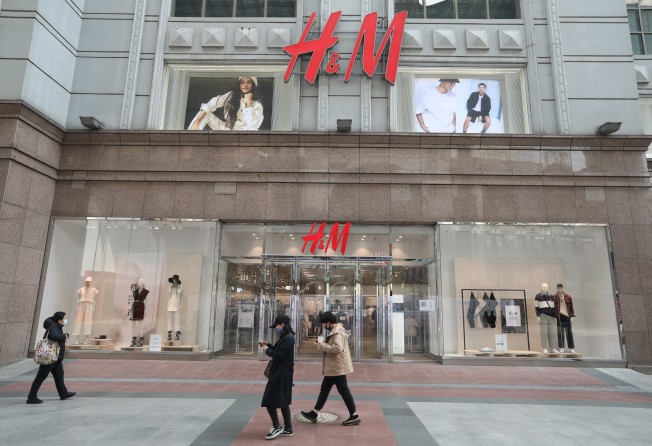China state media claim Xinjiang conspiracy hidden in old video of retired US colonel
- A 2018 speech by a career US army officer given new life in a Beijing Daily social media post as evidence clothing firm H&M is ‘just a puppet’
- Lawrence Wilkerson’s comments that the CIA could use Uygurs in Xinjiang to ‘destabilise China’ cited as proof of ‘an information war’ by the US

Chinese state media have publicised a speech given by a retired American army colonel three years ago in an attempt to unravel an alleged conspiracy by the United States behind the Xinjiang cotton row.
A WeChat account managed by Beijing Daily published an article titled “H&M is just a puppet; a bigger conspiracy is behind it!” on Thursday, referring to the Swedish multinational clothing retailer facing a boycott in China over its refusal to buy Xinjiang cotton.
The article quoted a 2018 speech by Lawrence Wilkerson, a career army officer, who said if the US Central Intelligence Agency wanted to destabilise China, the best way to do so would be to mount an operation using Uygurs in the country’s far-west region.
“They would foment unrest and to join with those Uygurs in pushing the Han Chinese in Beijing from internal places rather than external,” he said three years ago at Texas-based Ron Paul Institute’s 2018 Washington conference.
Wilkerson served in the US Pacific Command in South Korea, Japan and Hawaii. After retiring from US army service in 1997, Wilkerson served then secretary of state Colin Powell’s chief of staff in 2002-05 and helped to sell the Iraq war in 2003. He also took part in the US invasion of Afghanistan.
A recording of Wilkerson’s speech in 2018 showed him explaining the US military’s decision to fight a war in Afghanistan.
Two of the objectives for the US troops were to have a presence in Afghanistan to disrupt China’s Belt and Road Initiative and to leap on and stabilise Pakistan’s nuclear stockpile if necessary, according to Wilkerson.
“And the third reason we are there is because there are 20 million Uygurs and they don’t like Han Chinese in Xinjiang Province in western China.
“And if the CIA has to mount an operation using those Uygurs, as [Turkish President] Erdogan has done in Turkey against Assad … Well, the CIA would want to destabilise China, and that would be the best way to do it.’’
“I’m not saying it’s going on now … but it is a possibility,” Wilkerson said in the video, adding that the US military had “decided that for these strategic reasons, which are well thought out, that we are going to be in Afghanistan for the next half-century.”
Chinese state broadcaster CGTN ran the video clip on Thursday with Chinese subtitles and said “one may get some clues” from Wilkerson’s speech to “why the US [is] making such accusations over China’s human rights issue”.
Wilkerson, a Republican who has been studying China issues over a decade, is still giving lectures at prominent universities, but it is not clear he has any connection with the present administration or how influential he is. But this video clip is now used by the Chinese to illustrate that the US is trying to wage an information war on China.
The Chinese foreign ministry also ran the video at its daily press conference on Friday afternoon and spokeswoman Hua Chunying said the real purpose of the US was to destabilise and contain the rise of China.
The Chinese article commented “it is the model strategy: by sanctioning Xinjiang products, cracking down on Xinjiang’s labour force, increasing regional unemployment, and inciting colour revolutions – that’s an American plot started by a scam leveraging human rights”.
China is under growing pressure over its treatment of ethnic minorities in Xinjiang. In January, former US secretary of state Mike Pompeo accused Beijing of “genocide and crimes against humanity” for its treatment of Uygur Muslims in the region. The US, European Union, Canada and Britain imposed sanctions on China, and Beijing has since hit back.
Beijing has repeatedly denied the allegations and defended its policies in the region to contain terrorism and separatism. During his trip to the region this week, China’s Minister of Public Security Zhao Kezhi hit out at external attempts to use Xinjiang or terrorism to contain Beijing.
Chinese social media began to buzz this month with the news that international fashion companies, including H&M, had publicly disavowed the use of cotton produced in Xinjiang over allegations that forced labour was being used in its production.
Although some of these statements had been made the previous year, the rise in awareness led to public boycotts of the brands, and some of the products being removed from Chinese-owned online marketplaces.
On Thursday, foreign ministry spokeswoman Hua said allegations about human rights violations in the region were based on lies.
She also said the reaction from China’s online community about the cotton boycott was simply “patriotism”, and that it was “quite natural and normal” for Chinese people to feel angry.
On Thursday, Hu Xijin, editor-in-chief of the Global Times, a nationalistic newspaper in the People’s Daily stable, said “the escalation of opposition around Xinjiang was likely to have just begun”.
“The US currently focuses on mobilising the West on the Xinjiang issue and drawing as many countries and companies as possible into the sanctions on Xinjiang. It will continue to fuel Xinjiang’s ‘genocide’ label so that the topic will become ubiquitous in the West’s political discourse on China,” he said.